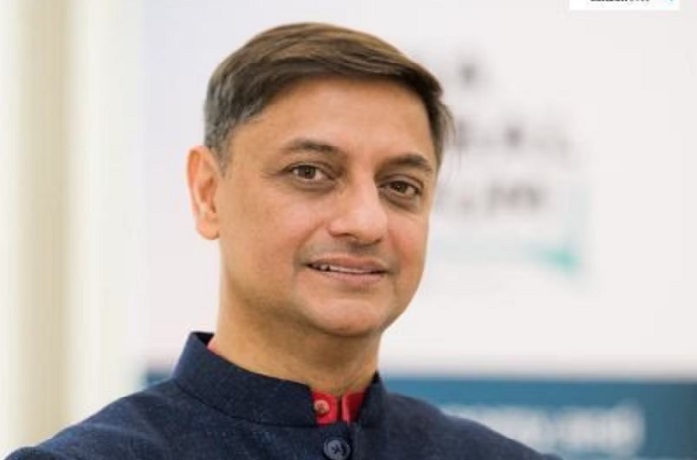
Muscat: Sanjeev Sanyal, an internationally acclaimed economist and a key advisor to the Indian Prime Minister, forecasted a bright future for India's economy, projecting it to soon claim the position of the world's third-largest economy.
Speaking exclusively to Times of Oman during his recent visit to the Sultanate, Sanyal remarked:
"In the past two years, India has maintained a commendable 7 percent annual growth rate, surpassing all other major economies worldwide. Despite global economic stagnation, our sustained growth momentum positions us as the fastest-growing economy globally."
"Presently ranked fifth in GDP, we anticipate overtaking Germany within the next 18 months to become the fourth-largest economy, and subsequently surpassing Japan in the next 18 months to claim the third spot, trailing only the USA and China."
Highlighting India's economic resilience, Sanyal emphasised, "Our ability to sustain robust growth amidst global economic challenges is noteworthy. With a solid economic framework established over the past decade, we have the potential to sustain growth rates around 7-8 percent consistently. Already, in terms of purchasing power parity, India is ranked as the third-largest economy."
Acknowledging India's ongoing challenge of income inequality, Sanyal conceded, "While India's economic strides are significant, we must recognise that in per capita terms, we remain a nation with vast disparities."
He elaborated, "Sustained growth averaging 7-8 percent over the next 25 years is imperative to elevate the standard of living for all. As Prime Minister Narendra Modi aptly phrases it, ‘Amritkaal’, the next 25 years are crucial for India's development journey. Merely achieving the status of the third-largest economy is not our ultimate goal; we aspire for comprehensive socio-economic upliftment."
Regarding India's expanding economic influence, Sanyal added, "India's sheer economic size confers strategic advantages. By the end of this decade, our economy's scale will facilitate global competitiveness, particularly in sectors like manufacturing. Strengthened fiscal resources enable us to engage assertively in international trade and geopolitical negotiations, thus reshaping our global standing."
Combatting poverty
Despite rapid economic growth, India's government has made substantial strides in poverty alleviation. Sanyal said, "India's ongoing poverty reduction initiatives represent one of the most significant endeavours in history, with tangible improvements in nutrition, longevity, and overall well-being. Sustainable growth remains the linchpin for poverty eradication and job creation."
“Going by the NitiAyog multidimensional poverty indicators, we have eliminated hundreds of millions of poor in last decade. We are a big country with big population. With growth, we can clearly say poverty is getting reduced. As our middle class is dramatically growing, we are making rapid strides in elimination. However, complete elimination of poverty is still some time away.”
Driving forces of growth
Sanyal attributed India's robust growth to fundamental strengths across various sectors. He cited, "The services sector's dynamism, coupled with unprecedented infrastructure development, including airports, roads, ports, and railways, has bolstered economic expansion."
"Structural reforms such as the implementation of Goods and Services Tax (GST) and the Insolvency and Bankruptcy Code (IBC) have streamlined economic processes, enhancing institutional efficiency and financial sector resilience."
He added: “In 2017, the government introduced the goods and sales tax (GST) across the country, making India an economic union. Before GST, businesses had to pay all sorts of taxes and tariffs to state governments and the national government. Exporting from one part of the country to another was arduous. We didn’t have an integrated common market. Effectively, GST is like a Free Trade Agreement that India did for itself."
“Another structural reform was when the government instituted the Insolvency and Bankruptcy Code (IBC) in 2016. The goal was to clean up the banks. The IBC instituted a brand new system that turned out to be successful. As a result, banks are a lot healthier today.”
Economic reform agenda
Highlighting the government's pragmatic approach to economic policy, Sanyal underscored ongoing reforms aimed at enhancing competitiveness and ease of doing business.
He remarked, "Beyond structural reforms, emphasis is now on procedural enhancements and administrative streamlining. Addressing bureaucratic inefficiencies and judicial reforms are imperative to unleash India's full economic potential."
Elaborating further, Sanyal said: “The government recognises that judicial reforms are necessary to unleash higher economic growth. Over 40 million cases are pending in the courts. Processes are archaic, and enforcement of contracts is poor. The dysfunctional judicial system adds to transaction costs in the economy and slows down economic growth. Now, the country has to move from the model where the bureaucracy controls everything to one where it provides public services. Service delivery is the top priority.”
“Small process reforms are a very important part of improving India's competitiveness and ease of doing business,” he added.
On inflation issue, he responded: “The momentum in domestic inflation is well-contained. Overall CPI inflation has been in the range of 2-6 per cent. And this is not just about inflation; the overall macro stability indicators are all in good shape.”
Engagement with emerging technologies
Anticipating the disruptive impact of emerging technologies, Sanyal affirmed India's commitment to harnessing advancements in AI, space technology, and drones.
He asserted, "India's proficiency in these domains positions us to actively engage with technological transformations, thereby shaping the evolving global landscape."
In conclusion, Sanyal stressed India's adaptability and proactive stance in navigating the complexities of the contemporary world.
He remarked, "Flexibility, rather than predictive certainty, will define India's success trajectory. With a government and policy framework marked by unprecedented agility, India is poised to emerge as a global economic powerhouse, driving inclusive growth and prosperity."